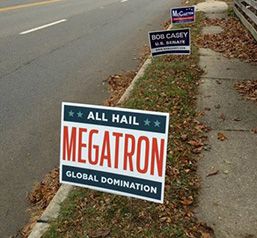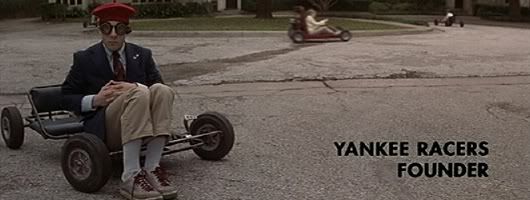 Originally Posted by EvilNed

As I said, this would of course vary locally.
People fleeing to Canada to take a chance and see if it's better there, defecting police planning to go to an island, a scientist proposing to drop atomic bombs on the big cities to get rid of as many zombies as possible, the media going off the air, small armies of gun-toting motorized looters pillaging anything on their path... Dawn already paints a bleak picture of the US on a straight course to collapse. As Roger says: "They got enough in their hands." It is more than just local incidents, it's a national crisis. By the time of Day things have even gotten worse.
Dawn showed many police officers defecting, they are also a federal institution.
When a relay station in Missouri burns down, how are you gonna repair it if you're in D.C. if all of your Missouri boys have been eaten or fled the coup?
Yes, indeed, but that's in fact the point. The government itself is having a heck of a lot of trouble trying to maintain something as relatively simple as this, because as your above example illustrates, the infrastructure that maintained such things before has now been severely affected. So for a private entrepreneur like Kaufman to have an easier time to do such things, and even more complicated ones like maintaining large armies or even building complex war machines sounds a bit too far fetched. Had Kaufman's outpost been something more rudimentary, like Alexandria, Woodbury, or the prison in TWD I would be the first one admitting that there wouldn't be much of a problem here.
Again, that would vary from place to place. Some were worse off, some were better off. There is nothing uniform you can apply to the entire spectrum. The only thing that IS certain is that one of the greatest empires ever collapsed and smaller local kingdoms emerged in the power vacuum. As in Land.
Yes, but unlike Land the local kingdoms were not better at keeping things running than the collapsed empire. It took several centuries to get back on track.
It's a film. All dialogue exists for a purpose.
Yes, but unfortunately in the case of the dialogue in question, it is a bit vague. Also, notice that driving a car out of the city is hardly something that the zombie situation has put a stop to. Riley himself wants to do just that, the zombie problem outside notwithstanding. So the "mechanic" saying such a thing as not having driven out of the city in 3 years does not necessarily ring "zombie-situation" bells. That would certainly be the case if going out of the city in a car was out of the question. But I do understand your point, and I have not denied that it very much can be interpreted like you prefer to interpret it (two 3 year references = likely points at the zombie crisis), and it likely makes more sense that way. But it is not the only choice. Had those bits of dialogue been more specific, they would not allow for any other interpretation.
Very well and then I will nitpick the decay rate of a newspaper.
You could, if you could also prove its whereabouts all this time. Keep in mind it is an inanimate object devoid of any character, personality, mentality, will and emotions. It can't move by itself, it can't take decisions on its own, it can't convey any ideas to anyone except for what is printed on it. It is a heck of a challenge to try to derive any deductions whatsoever about it, other than it is an old newspaper being swept by the wind in a desolate city.
Incorrect. The Roman empire could not defend all of it's territory, which is part of the reason it collapsed. Many places improved and stabilized from a security point-of-view when formation of localized kingdoms emerged. For instance, the cementation of a gothic kingdom in Italy put an end to many instances of succession wars within the Roman Empire.
In any case, the point is irrelevant since the point is that in a power vacuum other states can emerge.
The Goths were notoriously inept rulers when compared to the Romans. They spent a lot of their time fighting each other for power. So were all the other "barbarian" tribes (Vandals, Franks, Huns, etc.) who were largely responsible for the collapse of the empire to begin with. They were great warriors (the Romans in fact had been employing them as mercenaries in their armies), but as rulers and administrators they did not have the talent of the Romans and other more civilized peoples from the Mediterranean world. Under their control such things as aqueducts and roads fell in disrepair and forced the populace to have a harder time to have access to water and transportation routes. This was not an improvement over the more efficient Roman empire.
- - - Updated - - -
 Originally Posted by facestabber

jdp you truly are unique. Even one of your Dumber and I mean truly dumb theories that a complex machine like dead reckoning is impossible to build "later on".
So according to your truly dumb theories it is perfectly logical that a private crook like Kaufman can have the resources and manpower at his disposal to maintain cities, armies and build complex machines with computers, radio, fireworks, machine guns and long range rockets, but somehow the US government with its way larger resources is hiding in bunkers and can no longer even keep its communication network going on? I thought that since you were the first to bring up TWD as a comparison that you would have learned something about this by its way more realistic portrayal of such a situation.
Mankind just up and quits huh? At first you couldn't handle Land being 3 years in. You got proved wrong by the man that made the movie. No need to address this because I'm sure you saw a piece of cotton in day with some new evidence of decay. Hey cool idea, post your forensics degree with emphasis on clothes decay in the zombie apocalypse.
Romero can think what he wants, but the fact is that the way he made these two movies he totally failed in conveying any such thing. And regarding the degree of decay of the zombies of Day when compared to those of all his other zombie movies, including Land, I am not the only one who has easily noticed this detail by any means. A university professor of Film Studies who has written an entire book devoted to George Romero's films has easily pointed out the fact, for example:
Following the caption, "Some Time Ago", black and white images appear under the opening credits depicting the beginning of the zombie plague with voice-overs repeating lines from earlier films. Then the screen changes to a blue filter image depicting a world where the zombies control the outer perimeters of civilization. A caption appears, "Today". Since the zombies appear in various stages of decomposition,the suggestion is that this contemporary brave new world OCCUPIES A TIME SOMEWHERE BETWEEN THE END OF DAWN OF THE DEAD AND THE BEGINNING OF DAY OF THE DEAD, WHOSE ZOMBIES (with the exception of "Bub") APPEAR IN MORE ADVANCED STAGES OF DECOMPOSITION. Land of the Dead occupies a cinematic parallel world to those of the earlier films, unlike Diary of the Dead, which moves its action back to the very beginning of Night of the Living Dead. Romero has moved away from a linear chronological depiction of events towards a narrative reflecting different movements paralleling the ones he depicted in his earlier zombie trilogy. ---- Tony Williams, The Cinema of George A. Romero: Knight of the Living Dead, page 185. Columbia University Press, 2015.
https://books.google.com/books?id=W3...20DEAD&f=false
And then we move on to this goofy notion that Romero created Land of Dead with a "fairly" safe world outside Fiddlers. Wtf is the point of anyone staying in Fiddlers under Kaufmans rule. How the hell could a movie that's supposed to terrify us about a world full of zombies work if it's safe? Excuse me "relatively safe".
You are not a very good observer, are you? Even one of the major characters in the film persistently WANTS to leave the city in a simple car and try his luck out there to find a better place. Foxy and Cholo don't see any problem whatsoever in cruising all the way to Cleveland in a car without a roof. Kaufman does not seem to be very worried about escaping the zombie invasion of his city in a limo. People are totally free to leave the city whenever they please. Can you really be this unperceptive not to notice any of this? The world of Land does not even come across as dangerous as that of Dawn, where the zombie situation has gotten bad enough that only large groups of armed survivors dare to venture outside anymore. Example: the biker army openly defies the zombies and continues its on-the-road looting rampage quite unimpaired, but these guys are armed to the teeth and there's a bunch of them, otherwise they too would have been dead meat by now. So let alone than the more dangerous, desolate and zombie-infested world of Day. As long as you keep away from zombie towns and cities in Land, the danger is not that great. The characters in the movie venture outside the city in vehicles rather casually as long as they don't have to go into zombie towns.
You should seek out Romero and beat him up for failing you. If he just stopped with Day you'd live happily ever after. But it seems you made this revelation of yours at a nerd convention, got challenged and hurt feelings, and now are on a mission of delusion. Romero came back to do Land. Decided not to set it between Night and Day. Gave us a 3 year timeframe of Land. But you will once again ignore that and talk about wardrobe 20 years prior, complex dead reckoning and the safe zombie filled world outside Fiddlers. You need to yell at George for not meeting your wardrobe standards in a world and universe that he created. And berate him over the technology of dead reckoning because as we all know no engineers survived. How dare George have an idea of how society may rebuild in the universe he created. You know what I'm pissed at George now too.
I will tell you what. I met Nicotero last year and have an opportunity to in a couple months. I will ask him and report is answer either way.
I told you, one thing are Romero's intentions and another one are how his movies actually come across. Sometimes he totally misses the mark and therefore they can be nitpicked. A private crook being able to sustain such an advanced society that can even produce such complex machines as Dead Reckoning would be an anachronism in a post-Day world where even the very government and its infrastructure has collapsed. Again, take notes from the very show (TWD) that you brought up, which handles such a situation much more realistically.
That university professor who wrote a whole book on Romero's movies, which I quoted above, points out the obvious difference between the more decayed zombies of Day and the usually "fresher" looking zombies of Land and the other movies. So keep on fantasizing that I am the only one who has noticed such obvious things. You can also read many of that movie's reviews out there that also point out the same. The world of Day looks more decayed than any of the other Romero movies. The fact that you are not very perceptive to notice such things does not mean that others have failed to notice them.
|






 Reply With Quote
Reply With Quote






Bookmarks